Max Zimmer
From Associations to Activations: Comparing Behavioral and Hidden-State Semantic Geometry in LLMs
Jan 31, 2026Abstract:We investigate the extent to which an LLM's hidden-state geometry can be recovered from its behavior in psycholinguistic experiments. Across eight instruction-tuned transformer models, we run two experimental paradigms -- similarity-based forced choice and free association -- over a shared 5,000-word vocabulary, collecting 17.5M+ trials to build behavior-based similarity matrices. Using representational similarity analysis, we compare behavioral geometries to layerwise hidden-state similarity and benchmark against FastText, BERT, and cross-model consensus. We find that forced-choice behavior aligns substantially more with hidden-state geometry than free association. In a held-out-words regression, behavioral similarity (especially forced choice) predicts unseen hidden-state similarities beyond lexical baselines and cross-model consensus, indicating that behavior-only measurements retain recoverable information about internal semantic geometry. Finally, we discuss implications for the ability of behavioral tasks to uncover hidden cognitive states.
SparseSwaps: Tractable LLM Pruning Mask Refinement at Scale
Dec 11, 2025Abstract:The resource requirements of Neural Networks can be significantly reduced through pruning -- the removal of seemingly less important parameters. However, with the rise of Large Language Models (LLMs), full retraining to recover pruning-induced performance degradation is often prohibitive and classical approaches such as global magnitude pruning are suboptimal on Transformer architectures. State-of-the-art methods hence solve a layer-wise mask selection problem, the problem of finding a pruning mask which minimizes the per-layer pruning error on a small set of calibration data. Exactly solving this problem to optimality using Integer Programming (IP) solvers is computationally infeasible due to its combinatorial nature and the size of the search space, and existing approaches therefore rely on approximations or heuristics. In this work, we demonstrate that the mask selection problem can be made drastically more tractable at LLM scale. To that end, we decouple the rows by enforcing equal sparsity levels per row. This allows us to derive optimal 1-swaps (exchanging one kept and one pruned weight) that can be computed efficiently using the Gram matrix of the calibration data. Using these observations, we propose a tractable and simple 1-swap algorithm that warm starts from any pruning mask, runs efficiently on GPUs at LLM scale, and is essentially hyperparameter-free. We demonstrate that our approach reduces per-layer pruning error by up to 60% over Wanda (Sun et al., 2023) and consistently improves perplexity and zero-shot accuracy across state-of-the-art GPT architectures.
A Free Lunch in LLM Compression: Revisiting Retraining after Pruning
Oct 16, 2025Abstract:While Neural Network pruning typically requires retraining the model to recover pruning-induced performance degradation, state-of-the-art Large Language Models (LLMs) pruning methods instead solve a layer-wise mask selection and reconstruction problem on a small set of calibration data to avoid full retraining, as it is considered computationally infeasible for LLMs. Reconstructing single matrices in isolation has favorable properties, such as convexity of the objective and significantly reduced memory requirements compared to full retraining. In practice, however, reconstruction is often implemented at coarser granularities, e.g., reconstructing a whole transformer block against its dense activations instead of a single matrix. In this work, we study the key design choices when reconstructing or retraining the remaining weights after pruning. We conduct an extensive computational study on state-of-the-art GPT architectures, and report several surprising findings that challenge common intuitions about retraining after pruning. In particular, we observe a free lunch scenario: reconstructing attention and MLP components separately within each transformer block is nearly the most resource-efficient yet achieves the best perplexity. Most importantly, this Pareto-optimal setup achieves better performance than full retraining, despite requiring only a fraction of the memory. Furthermore, we demonstrate that simple and efficient pruning criteria such as Wanda can outperform much more complex approaches when the reconstruction step is properly executed, highlighting its importance. Our findings challenge the narrative that retraining should be avoided at all costs and provide important insights into post-pruning performance recovery for LLMs.
Computational Algebra with Attention: Transformer Oracles for Border Basis Algorithms
May 29, 2025Abstract:Solving systems of polynomial equations, particularly those with finitely many solutions, is a crucial challenge across many scientific fields. Traditional methods like Gr\"obner and Border bases are fundamental but suffer from high computational costs, which have motivated recent Deep Learning approaches to improve efficiency, albeit at the expense of output correctness. In this work, we introduce the Oracle Border Basis Algorithm, the first Deep Learning approach that accelerates Border basis computation while maintaining output guarantees. To this end, we design and train a Transformer-based oracle that identifies and eliminates computationally expensive reduction steps, which we find to dominate the algorithm's runtime. By selectively invoking this oracle during critical phases of computation, we achieve substantial speedup factors of up to 3.5x compared to the base algorithm, without compromising the correctness of results. To generate the training data, we develop a sampling method and provide the first sampling theorem for border bases. We construct a tokenization and embedding scheme tailored to monomial-centered algebraic computations, resulting in a compact and expressive input representation, which reduces the number of tokens to encode an $n$-variate polynomial by a factor of $O(n)$. Our learning approach is data efficient, stable, and a practical enhancement to traditional computer algebra algorithms and symbolic computation.
RECON: Robust symmetry discovery via Explicit Canonical Orientation Normalization
May 19, 2025Abstract:Real-world data often exhibits unknown or approximate symmetries, yet existing equivariant networks must commit to a fixed transformation group prior to training, e.g., continuous $SO(2)$ rotations. This mismatch degrades performance when the actual data symmetries differ from those in the transformation group. We introduce RECON, a framework to discover each input's intrinsic symmetry distribution from unlabeled data. RECON leverages class-pose decompositions and applies a data-driven normalization to align arbitrary reference frames into a common natural pose, yielding directly comparable and interpretable symmetry descriptors. We demonstrate effective symmetry discovery on 2D image benchmarks and -- for the first time -- extend it to 3D transformation groups, paving the way towards more flexible equivariant modeling.
DUNIA: Pixel-Sized Embeddings via Cross-Modal Alignment for Earth Observation Applications
Feb 24, 2025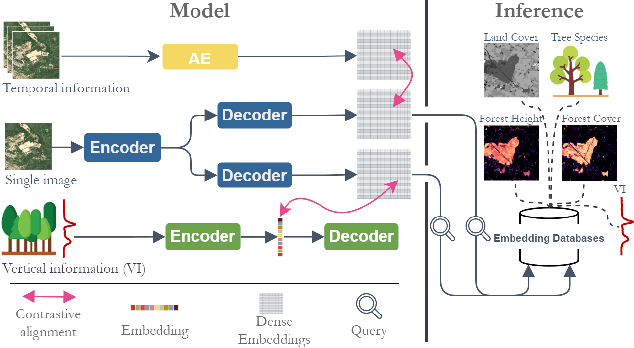

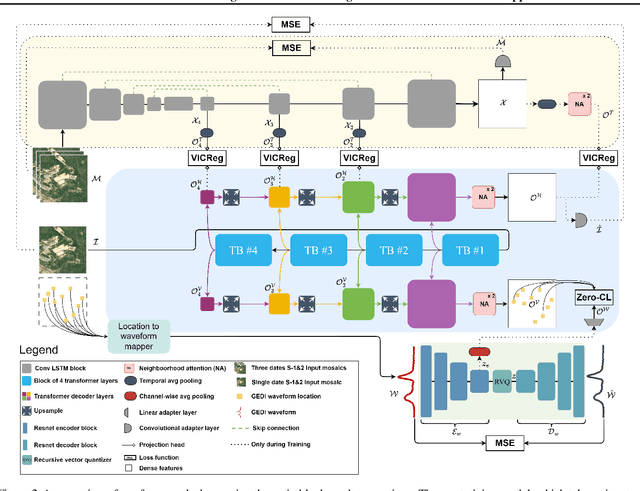

Abstract:Significant efforts have been directed towards adapting self-supervised multimodal learning for Earth observation applications. However, existing methods produce coarse patch-sized embeddings, limiting their effectiveness and integration with other modalities like LiDAR. To close this gap, we present DUNIA, an approach to learn pixel-sized embeddings through cross-modal alignment between images and full-waveform LiDAR data. As the model is trained in a contrastive manner, the embeddings can be directly leveraged in the context of a variety of environmental monitoring tasks in a zero-shot setting. In our experiments, we demonstrate the effectiveness of the embeddings for seven such tasks (canopy height mapping, fractional canopy cover, land cover mapping, tree species identification, plant area index, crop type classification, and per-pixel waveform-based vertical structure mapping). The results show that the embeddings, along with zero-shot classifiers, often outperform specialized supervised models, even in low data regimes. In the fine-tuning setting, we show strong low-shot capabilities with performances near or better than state-of-the-art on five out of six tasks.
Approximating Latent Manifolds in Neural Networks via Vanishing Ideals
Feb 20, 2025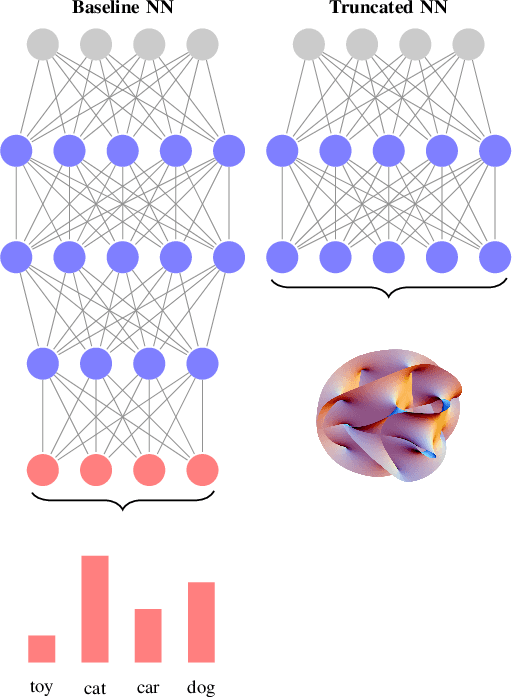
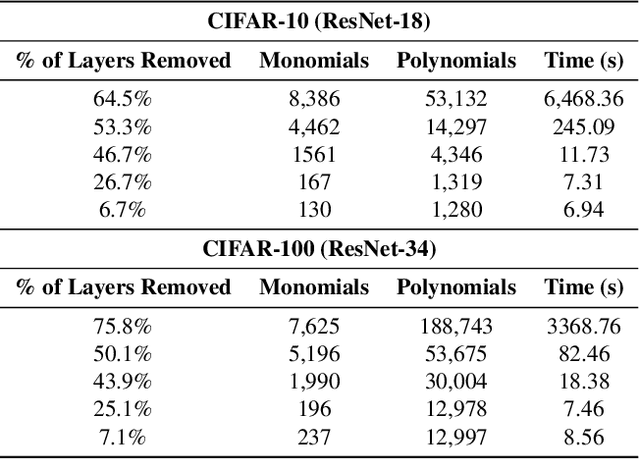
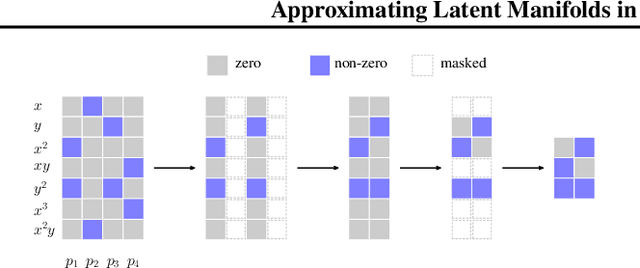
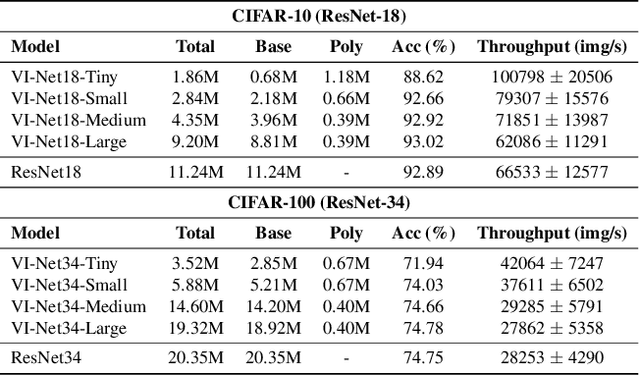
Abstract:Deep neural networks have reshaped modern machine learning by learning powerful latent representations that often align with the manifold hypothesis: high-dimensional data lie on lower-dimensional manifolds. In this paper, we establish a connection between manifold learning and computational algebra by demonstrating how vanishing ideals can characterize the latent manifolds of deep networks. To that end, we propose a new neural architecture that (i) truncates a pretrained network at an intermediate layer, (ii) approximates each class manifold via polynomial generators of the vanishing ideal, and (iii) transforms the resulting latent space into linearly separable features through a single polynomial layer. The resulting models have significantly fewer layers than their pretrained baselines, while maintaining comparable accuracy, achieving higher throughput, and utilizing fewer parameters. Furthermore, drawing on spectral complexity analysis, we derive sharper theoretical guarantees for generalization, showing that our approach can in principle offer tighter bounds than standard deep networks. Numerical experiments confirm the effectiveness and efficiency of the proposed approach.
Capturing Temporal Dynamics in Large-Scale Canopy Tree Height Estimation
Jan 31, 2025



Abstract:With the rise in global greenhouse gas emissions, accurate large-scale tree canopy height maps are essential for understanding forest structure, estimating above-ground biomass, and monitoring ecological disruptions. To this end, we present a novel approach to generate large-scale, high-resolution canopy height maps over time. Our model accurately predicts canopy height over multiple years given Sentinel-2 time series satellite data. Using GEDI LiDAR data as the ground truth for training the model, we present the first 10m resolution temporal canopy height map of the European continent for the period 2019-2022. As part of this product, we also offer a detailed canopy height map for 2020, providing more precise estimates than previous studies. Our pipeline and the resulting temporal height map are publicly available, enabling comprehensive large-scale monitoring of forests and, hence, facilitating future research and ecological analyses. For an interactive viewer, see https://europetreemap.projects.earthengine.app/view/temporalcanopyheight.
Neural Discovery in Mathematics: Do Machines Dream of Colored Planes?
Jan 30, 2025



Abstract:We demonstrate how neural networks can drive mathematical discovery through a case study of the Hadwiger-Nelson problem, a long-standing open problem from discrete geometry and combinatorics about coloring the plane avoiding monochromatic unit-distance pairs. Using neural networks as approximators, we reformulate this mixed discrete-continuous geometric coloring problem as an optimization task with a probabilistic, differentiable loss function. This enables gradient-based exploration of admissible configurations that most significantly led to the discovery of two novel six-colorings, providing the first improvements in thirty years to the off-diagonal variant of the original problem (Mundinger et al., 2024a). Here, we establish the underlying machine learning approach used to obtain these results and demonstrate its broader applicability through additional results and numerical insights.
Estimating Canopy Height at Scale
Jun 03, 2024



Abstract:We propose a framework for global-scale canopy height estimation based on satellite data. Our model leverages advanced data preprocessing techniques, resorts to a novel loss function designed to counter geolocation inaccuracies inherent in the ground-truth height measurements, and employs data from the Shuttle Radar Topography Mission to effectively filter out erroneous labels in mountainous regions, enhancing the reliability of our predictions in those areas. A comparison between predictions and ground-truth labels yields an MAE / RMSE of 2.43 / 4.73 (meters) overall and 4.45 / 6.72 (meters) for trees taller than five meters, which depicts a substantial improvement compared to existing global-scale maps. The resulting height map as well as the underlying framework will facilitate and enhance ecological analyses at a global scale, including, but not limited to, large-scale forest and biomass monitoring.
 Add to Chrome
Add to Chrome Add to Firefox
Add to Firefox Add to Edge
Add to Edge